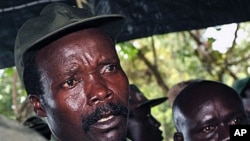Ugandan officials say the U.S. decision to send military advisers to the region is welcome assistance in the fight against the rebel Lord's Resistance Army.
But some Ugandans are wary of the timing of the decision and American intentions.
One hundred American military personnel, mostly special forces, will soon be helping the Ugandan military track down Joseph Kony, leader of a movement that terrorized the northern part of the country for 20 years. The first U.S. personnel arrived in Kampala last week.
Minister of the presidency in the Ugandan cabinet, Kabakumba Masiko, welcomes international military support in dealing with Kony’s group, the Lord's Resistance Army.
“We have always said to anybody who will listen that this [LRA] is a terrorist organization," said Masiko. "If everybody could come with us to firmly deal with [them] and finally finish it, it will be a good thing.”
The supposed aim of the Lord’s Resistance Army, or LRA, is to establish a Christian theocracy in Uganda. But the group has long been notorious for the extreme brutality of its attacks on civilians -- attacks that include rape, mutilation and torture. It has also abducted tens of thousands of children over the years, whom it uses as child soldiers and sex slaves.
Kony and three other LRA leaders are currently wanted by the International Criminal Court for war crimes and crimes against humanity.
In recent years, Kony and the LRA have moved out of northern Uganda into neighboring countries, including South Sudan, the Central African Republic and the Democratic Republic of Congo. In a letter to Congress Friday, President Obama described the group as a threat to regional stability.
The Americans deployed to the region are not meant to engage the LRA directly, except in self-defense. Masiko says that their role is meant to be mostly advisory.
“It is going to be in the area of intelligence gathering and sharing and liaison," said Masiko.
The U.S. launched a similar support operation to try to subdue the LRA in 2008. That mission failed to capture Kony and other commanders. The operation came under criticism by human-rights advocates who said the effort resulted in a campaign of revenge by LRA fighters who killed hundreds of civilians in the months that followed.
While Ugandan officials have been positive about the arrival of the troops, some Ugandans, like this Kampala resident, wonder why the U.S. is acting now.
“I question their intentions, because they have waited over 20 years to come in and help, so I suspect there are other motives," he said. "They could really want to help. The point is that the help has come at such a point when it doesn’t even make as much sense to us as it would have meant then. Frankly, we have bigger needs than Kony right now.”
The deployment is in line with President Obama's public commitment to promote governance and human rights in Africa. The U.S. forces will primarily assist the Ugandan army, which has taken the lead in fighting the LRA.




